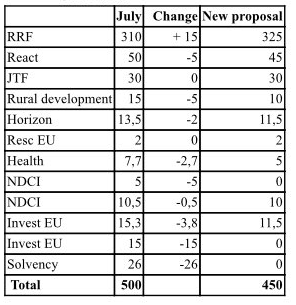This blog has been archived. A new one has been set up at this link.

The European Commission is working on a new proposal for its 2021-2027 multiannual budget, which is to be paired with a recovery plan aimed at helping the EU come out of the looming recession set in motion by the coronavirus pandemic.
Here, we gather the latest news and reactions to how the EU is planning to fund its research and innovation programmes during the difficult period ahead.
Tips are welcome at [email protected].
A new “negotiating box” floated at the EU leaders’ summit on Saturday suggests the EU Council is willing to cut the €13.5 billion boost to Horizon Europe proposed by the European Commission in the pandemic recovery fund. The council suggests only €11.5 billion from the recovery fund should be routed to the R&D programme.
If the council’s proposal for the core Horizon Europe budget remains untouched at €75.9 billion, the EU’s total R&D budget for 2021-2027 would be €87.4 billion (in 2018 prices).
The new figures are the new basis for the second day of negotiations among member states, after leaders have failed to reach an agreement on Friday evening.
Austria, Denmark, the Netherlands and Sweden wanted the grants portion of the recovery fund – which was initially set at €500 billion – to be smaller and called for the loans portion of the fund to be larger.
In the new proposal, EU Council president Charles Michel moved €50 billion in proposed grants to the loans box, cutting €2 billion from the Horizon Europe slice. The EU4Health programme could also see a €2.7 billion cut.
While it is uncommon for an EU agency to lobby during an EU Council summit, the European Research Council (ERC) renews a "plea" for its budget to be spared in the negotiations.
"We cannot imagine that EU leaders can agree to this while at the same time relying on the dedication/skills of Europe’s researchers to fight the ongoing pandemic & be ready to address unexpected future challenges," the ERC said in a post on Twitter.
The EU leaders’ summit is not over yet, but research associations are already expressing their dismay at the proposed cuts.
According to Kurt Deketelaere, secretary-general of the League of European Research Universities (LERU), “the disappointment will be enormous” if the budget is approved in its current form.
The newly €2 billion cut from the recovery fund portion of Horizon Europe comes only a week after Charles Michel proposed a €5 billion cut to the core programme, which will be financed from the EU’s multiannual budget.
Deketelaere admitted the numbers are “looking bad” but said it’s too late to reverse the changes. “A deal is closer than a lot of people think,” he said.
Research lobbies also decry the mismatch between the significant role of research and innovation during the coronavirus pandemic and how politicians choose to reward these sectors in budget crunch talks.
“It’s a breach of trust between the academic world and the political world,” said Deketelaere.
“We need European leaders who understand what will take us out of the current and future crisis,” tweeted Thomas Estermann, director for governance, funding and public policy development, at the European University Association.
"A science and innovation driven recovery is a must for all of Europe. It is particularly in the interests of member states which already invest heavily in R&I," said Jan Palmowski, secretary general of the Guild of European Research-intensive Universities.
InvestEU, a scheme to boost private and public investment could see its budget cut by €18.8 billion. In the European Commission's budget plan, the programme was slated to get €30.3 billion, of which €3.11 billion were ring fenced for research and innovation projects.
Changes to the grants portion of Next Generation EU, the pandemic recovery fund (€ billions):

Portuguese MEP Maria Graça Carvalho said the European Palriament "will have a strong voice" on the final adoption of the EU budget.
Carvalho, who is rapporteur of new legislation for the European Institute of Innovation and Technology (EIT), responded to the latest news that EU leaders could agree to further cuts to the Horizon Europe budget, of which the EIT will be allocated 3 per cent.
"I just want to stress that the European Parliament and the Council together are the budgetary authority," Carvalho said in a tweet. "The Treaties give the Parliament the right to reject the budget."
Enric Claverol-Tinturé, an expert in biomedical engineering and brain-related technologies, will be the European Innovation Council’s (EIC) new programme manager specialising in IT innovation.
Claverol-Tinturé, who will join the EIC Taskforce on 1 August, will help manage the EIC’s investments in start-ups producing breakthrough technologies and monitor their development.
He is the second EIC programme manager to be appointed this summer. The first one, Iordanis Arzimanoglou, who joined the taskforce on 1 June, specialises in biotechnology and biomedicine investments.
Six presidents of leading European research organisations yesterday sent a letter to Council President Charles Michel calling his new budget proposal for Horizon Europe ‘incomprehensible’ because it does not match Europe’s ambitious recovery goals.
The letter says the three goals – convergence, resilience and transformation – assume research and innovation will lead Europe’s recovery from the current crisis yet Michel’s ‘counterproductive’ proposal foresees 5 billion less for the EU’s research programme, Horizon Europe, than the European Commission had suggested in May.
The six presidents hope European policymakers will not accept the proposal during the EU budget negotiations at the council, which start today, instead choosing to increase the research programme's next seven-year budget.
The letter was signed by the chiefs of the G6 network of European research organisations: Italy’s National Research Council (CNR), France’s National Centre for Scientific Research (CNRS), Spain’s Council for Scientific Research (CSIC), the Helmholtz Association, the Leibniz Association, and the Max Planck Society.
Members of the European Parliament’s culture and education committee yesterday released a statement calling the Council President Charles Michel’s new 14 per cent lower Erasmus+ budget proposal “bad news for young people.”
“Charles Michel's suggested budget compromise for Erasmus+ and the European Solidarity Corps has taken a very low Commission proposal and managed to lower it even further,” said the statement.
Michel’s new proposal, tabled last Friday, allocates €21.2 billion for the EU’ education and youth programme, €3.4 billion under the €24.6 billion proposed by the commission in May.
The statement also recalled that back when Michel was the prime minister of Belgium, he “called for a 'ten-times Erasmus' and a budget focused on young people.”
"Our message to our heads of state and government is clear – please think again. We must deliver a budget that meets the needs and expectations of our citizens," concluded MEPs.
The European Commission yesterday selected 42 security research projects that will together receive €253 million from Horizon 2020, the EU’s R&I programme, in the next two to four years.
The projects cover six topics: 11 projects will develop solutions for disaster-resilient societies; 9 projects will help fight crime and terrorism; 7 projects will advance border and external security; 9 projects will research digital security; 5 projects will develop ways to protect the infrastructure and people in smart cities; and one will focus on general security matters.
Initially, the budget for the projects was said to be €233 million, however, the commission has increased the amount by €20 million “due to the high priority of security research at the EU level.”
The calls for the projects were launched in March 2019 and were open to applicants for six months. The commission received a total of 342 project applications, requesting nearly €1.2 million of EU funding.

Barcelona-based car manufacturer specialising in self-driving cars, Zanini, will receive €25 million in financing from the European Investment Bank to invest in research and innovation.
Zanini, which employs around 1400 people in 10 countries, will use the money to develop safer and more environment-friendly vehicles, upgrade its IT systems, and build a new car manufacturing plant near Barcelona.
The Investment Plan for Europe, the EU’s programme promoting private business investment under which Zanini is receiving support, has so far mobilised €514 billion across the EU, including €58.6 billion in Spain.

 A unique international forum for public research organisations and companies to connect their external engagement with strategic interests around their R&D system.
A unique international forum for public research organisations and companies to connect their external engagement with strategic interests around their R&D system.